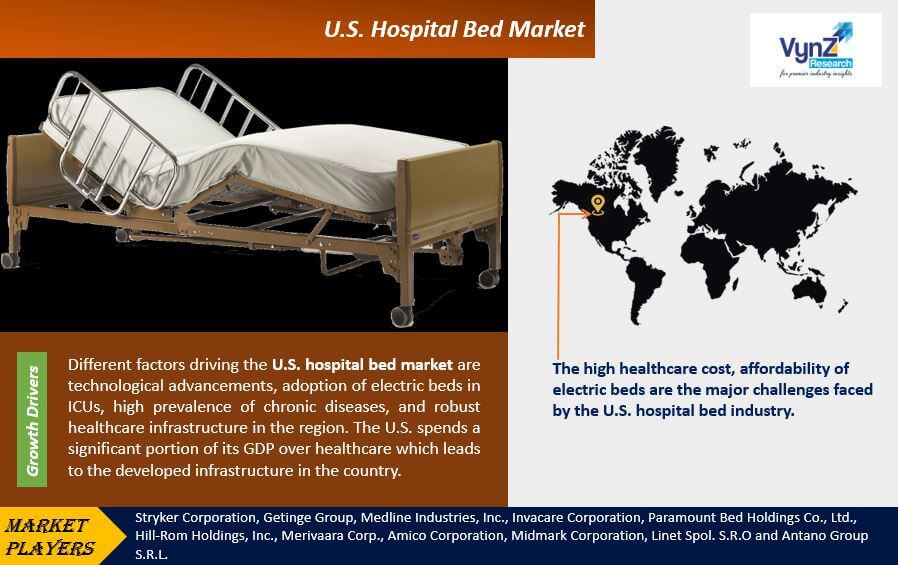U.S. Hospital Bed Market Size & Share | Growth Forecast Report 2030
Industry Insights by Area of Use (Acute Care, Critical Care, and Long-Term Care), by Type (General, Bariatric, Pediatric, Pressure Relief, Birthing, and Others), by Power (Manual, Electric, and Semi-Electric), by End-User (Hospitals, Elderly Care Facilities, and Home Care Settings) and by Geography (U.S)
| Status : Published | Published On : Nov, 2024 | Report Code : VRHC1191 | Industry : Healthcare | Available Format :

|
Page : 102 |
U.S. Hospital Bed Market Size & Share | Growth Forecast Report 2030
Industry Insights by Area of Use (Acute Care, Critical Care, and Long-Term Care), by Type (General, Bariatric, Pediatric, Pressure Relief, Birthing, and Others), by Power (Manual, Electric, and Semi-Electric), by End-User (Hospitals, Elderly Care Facilities, and Home Care Settings) and by Geography (U.S)
U.S. Hospital Bed Market Overview
The U.S. Hospital Bed Market is expected to grow at a CAGR of 4.0% during the forecast period with its market size predicted to reach USD 1.5 Billion by 2030. The U.S. hospital bed market is primarily driven by technological advancements, the adoption of electric beds in ICUs, the high prevalence of chronic diseases, and the robust healthcare infrastructure in the region. Bariatric beds and general beds are contributing significantly to the U.S. medical bed revenue due to the high prevalence of obesity and increasing lifestyle-associated diseases.

The key trend in the U.S. medical bed industry is the development and adoption of fully electric beds. Various studies have shown an adverse impact on the nursing community and patient caretakers due to the difficulties faced during the positioning of critically ill patients, resulting in injury to nurses, doctors, and patients themselves. Electric beds offer automatic patient position adjustments, pressure relief, and improved sleep to the patient; therefore, leading to high traction in the market.
U.S. Hospital Bed Market Report Coverage
|
Report Metric |
Details |
|
Historical Period |
2020 - 2024 |
|
Base Year Considered |
2025 |
|
Forecast Period |
2026 - 2035 |
|
Market Size in 2025 |
U.S.D. x.x Billion |
|
Revenue Forecast in 2035 |
U.S.D. 1.5 Billion |
|
Growth Rate |
4.0% |
|
Segments Covered in the Report |
By Type, By Area of Usage, By Power and By End-User |
|
Report Scope |
Market Trends, Drivers, and Restraints; Revenue Estimation and Forecast; Segmentation Analysis; Companies’ Strategic Developments; Market Share Analysis of Key Players; Company Profiling |
|
Regions Covered in the Report |
U.S. |
Industry Dynamics
U.S. Hospital Bed Market Trends / Growth Drivers:
Technological advancements such as electronic controls, adjustable height, pressure redistribution surfaces, the adoption of electric beds in ICUs, patient monitoring capabilities, the high prevalence of chronic diseases, and the robust healthcare infrastructure in the region are the aspects that drives the U.S. hospital bed market. The U.S. spends a significant portion of its GDP on healthcare which leads to the developed infrastructure in the country. The development of portable patient monitoring devices have led to an increase in the demand for medical beds for providing home care. Market growth is driven by the innovations like improved patient outcomes, and enhanced patient comfort. The risk of healthcare-associated infections is minimised as these beds aim to enhance patient comfort.
U.S. Hospital Bed Market Challenges
The high healthcare cost and affordability of electric beds are the factors that are hindering the U.S. hospital bed industry. The changing demographics and evolving patient needs pose challenges for the hospital bed market.
Recent Developments by Key Players
Stryker announced the opening of its Customer Experience Centre housed at Stryke. This state-of-the-art centre is designed to demonstrate the company's portfolio of medical equipment and offer an interactive environment for customers to exper.
Getinge introduced the DPTE®-FLEX, a manual, externally openable port designed to enhance safety and efficiency in pharmaceutical manufacturing. This port enables secure, gloveless component transfers, minimizing human intervention and reducing contamination risks.
U.S. Hospital Bed Market Segmentation
VynZ Research provides an analysis of the key trends in each segment of the U.S. Hospital Bed Market report, along with forecasts at the regional and country levels from 2025-2030. Our report has categorized the market based on type, area of usage, power and end-user.
RD_SEGMENT
U.S. Hospital Bed Market : Geographic Overview
Northeast region of U.S dominates the market due to a high concentration of specialized academic medical centers, hospitals, and advanced healthcare facilities.
U.S. Hospital Bed Market Competitive Insight
- Stryker Corporation
- Getinge Group
- Medline Industries Inc.
- Invacare Corporation
- Paramount Bed Holdings Co. Ltd.
- Merivaara Corp.
- Midmark Corporation
- Baxter International Inc.
Stryker Corporation is an American multinational medical technologies corporation based in Kalamazoo, Michigan. Stryker's products include implants used in joint replacement and trauma surgeries including surgical equipment and surgical navigation systems, endoscopic and communications systems.
Paramount Bed Holdings is a holding company of a comprehensive medical products and services group. The holding company determines and implements strategies, supervises the group's management and performs other administrative activities.
The U.S. Hospital Bed Market report offers a comprehensive market segmentation analysis along with an estimation for the forecast period 2025–2030.
PRIMARY RESEARCH INTERVIEWS - BREAKDOWN
.png)
Frequently Asked Questions
Purchase Options
Latest Report
Research Methodology
- Desk Research / Pilot Interviews
- Build Market Size Model
- Research and Analysis
- Final Deliverable
Connect With Our Sales Team
- Toll-Free: 1 888 253 3960
- Phone: +91 9960 288 381
- Email: enquiry@vynzresearch.com
U.S. Hospital Bed Market
